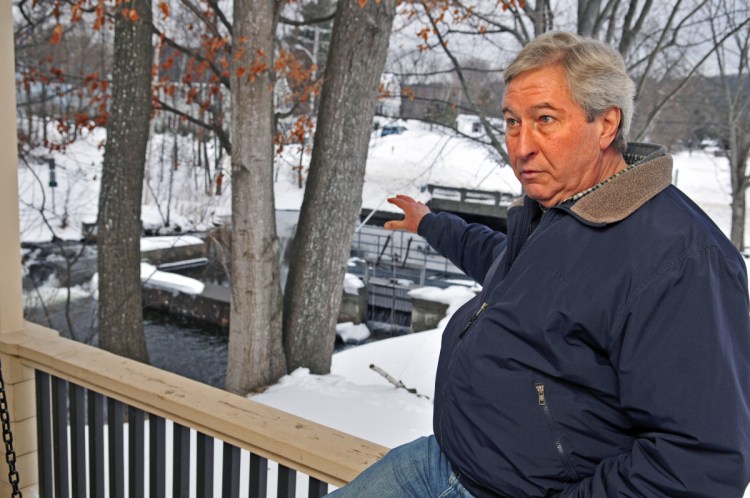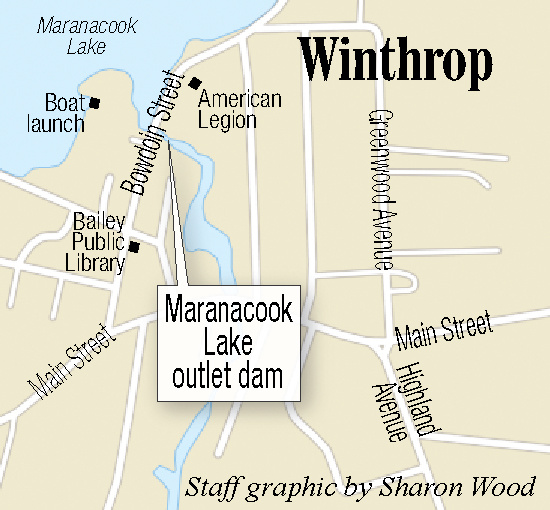WINTHROP — A family who lives near the south end of Maranacook Lake is worried that its house could collapse in the next year because of delays in a taxpayer-funded project to restore a nearby dam and stream bank.
While Winthrop officials have expressed sympathy for Patricia and Tom Heiss and are considering what intermediary steps they could take to protect their property, they haven’t made any firm commitments.
The Heiss family was hoping the project would have happened already, as they live next to the dam and their Bowdoin Street property has been eroding into the stream below it for more than a decade.
They say their land has receded about 8 feet over the last dozen years, so that the southwest corner of their house is now close the bank. Those changes have caused walls to move and a second-floor window to break, they say.
“December came and went and now our house is falling into the stream,” Tom Heiss said in an email to his neighbors in early July, which he forwarded to the Kennebec Journal. “(I)nterior walls are collapsing, windows are breaking. We paid to have the trees removed and will be having the house jacked and stabilized…all coming out of our retirement savings. … I just need to prevent our house from becoming a houseboat.”
The $476,500 dam repair is being jointly funded by the towns of Winthrop and Readfield. The main goal of the project is to improve the towns’ ability to control water levels on Maranacook Lake. In springtime, waterfront lawns can be flooded when the lake rises as much as two feet. Both towns became owners of the dam in 2006.
As part of the work, they plan to spend about $17,200 to stabilize the stream bank near the dam by clearing vegetation and laying down protective rocks, known as rip rap. A large portion of that stream bank lies on the Heiss property.
In return, the couple has granted a permanent easement to the towns, allowing local officials to use their property for maintenance of the dam and stream bank.
But last year, the first round of construction bids each came in greater than $400,000, which was double the cost that a consulting firm had estimated.
At the time, officials from Readfield and Winthrop decided they needed to delay the project so they could secure permitting and funding. The situation was particularly dire for Winthrop, which around that time was considering how to make up for a $1.5 million deficit.
“The towns didn’t have the money, and that was before Winthrop decided to borrow millions of dollars to stay afloat,” said Wendy Dennis, chairwoman of a committee that’s focused on the dam, during a July 9 meeting of the Winthrop Town Council. “… The Heisses are very disappointed that the streambank stabilization hasn’t been done yet. Who can blame them? They will rest easier when that is done, but there are reasons that hasn’t happened.”
This month, Winthrop councilors and their counterparts on the Readfield Select Board both approved a $476,500 bid from H.E. Callahan Construction Co. to do the work, starting in June 2019 and ending by October 2019. That was the lowest of three bids. The other two were $514,454 and $781,760.
Now, the Heiss family fears their property won’t be stabilized before their home suffers serious damage. They’re angry at local officials, who they say have misled them and not adequately responded to their complaints. And they worry they’ll have to try to fund the work themselves. They already have paid to have trees removed and to have an engineering firm, S.W. Cole Engineering Inc., assess their property.

Winthrop and Readfield officials have approved a $476,500 bid to repair the Maranacook Lake outlet dam, seen here on Thursday.
“We have nothing in our hand that said this project is going to be done in a timely manner,” said Patricia Heiss, during the July meeting of the Winthrop Town Council. “You have the right of way and we have nothing. And it’s a (serious concern) for us. It really is, and you guys don’t seem to understand that. We tried to call you. You never answered.”
At the July meeting, numerous Winthrop officials expressed sympathy for the Heiss family and discussed ways the town could help them in the coming year.
But one official said she doesn’t know whether the recent damage to their home was the result of the stream bank erosion or some other factor. Dennis, the chairwoman of the dam committee, said that there are other reasons windows can break in homes, but added that she had not seen the report by S.W. Cole.
“There’s been a communications breakdown,” Dennis said. “… What is really going on there, I can’t say. I thought it would be a good idea if you did get a professional in, but I’ve been told you had a professional and they said this and this.”
A copy of the S.W. Cole report about the Heiss property was provided to the Kennebec Journal. Its author, a geotechnical engineer, offered some explanations why the slope outside the Heiss’ home is eroding and causing the building to move, but he didn’t offer a prediction for how long the structure will remain standing.
In an email, Tom Heiss said that the engineer informally told him that pieces of ledge below his porch could fall within 6 to 12 months, rendering the building uninhabitable. But representatives of S.W. Cole did not respond to emails, a phone call, or a LinkedIn message seeking confirmation of that account.
Tom Heiss used to sit on the dam committee and the Winthrop planning board, but said he has left both groups because of the “mean and cruel” treatment he and his wife have received.
Winthrop councilors are now considering reimbursing the Heiss family for the tree removal they’ve paid for, as that work would have been done under the dam project anyway.
They also asked the family to provide a copy of the engineering report to the town, so that it can look into any other assistance that might be offered.
However, the Winthrop councilors stopped short of making any formal commitments, despite a proposal by one council member, Andy Wess, to do just that.
“I’m having a hard time after all these years not giving the Heisses some kind of commitment,” Wess said. “I think at some point you just have to kick the can and, when the numbers come in, do our best. … I know the Heisses are losing property, and that’s not going to stop until the project is completed.”
Sarah Fuller, chairwoman of the Town Council, said she wants to keep the matter on the council agenda going forward, but that she couldn’t approve any spending measures without knowing the impact.
“As with most decisions, it’s useful to have actual information, a plan, before we do it,” Fuller said.
Charles Eichacker — 621-5642
Twitter: @ceichacker
Send questions/comments to the editors.




